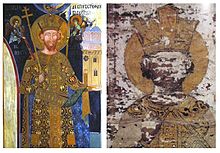Battle of Tripolje
| Battle of Tripolje | |||||||
|---|---|---|---|---|---|---|---|
 Stefan Lazarević and Đurađ Branković |
|||||||
|
|||||||
| Belligerents | |||||||
| Serbian Despotate |
Branković family Ottoman Empire |
||||||
| Commanders and leaders | |||||||
|
Stefan Lazarević Vuk Lazarević |
Đurađ Branković | ||||||
The Battle of Tripolje (Serbian Cyrillic: битка код Трипоља/бој на Трипољу), also known as the Battle of Gračanica (Грачаничка битка), was fought in November 1402 between the Serbian Despotate, ruled by the Lazarević dynasty, and the Branković family, aided by the Ottoman Empire.
Following the Ottoman defeat at Ankara in 1402, Serbian ruler Stefan Lazarević saw an opportunity to free himself of Ottoman overlordship. Awarded the high honorary title of despot by Byzantine Emperor Manuel II Palaiologos, Lazarević began to wield increasing autonomy in his political decision making. Following a quarrel, said to have arisen because of his nephew Đurađ Branković's intent to join forces with the new Ottoman sultan, Lazarević had Branković imprisoned. Freed by a friend, Branković joined the Ottoman ranks and was set to fight Lazarević. Buoyed by Ottoman reinforcements, Branković set up in Kosovo, along the route through which Lazarević would return from the Adriatic coast to the Serbian interior. The two sides clashed at the field of Tripolje on 21 November 1402. The larger part of Lazarević's army, commanded by his brother Vuk, engaged Branković's forces while Lazarević clashed with the Ottomans. While Vuk experienced setbacks fighting Branković's forces, Lazarević encountered more success in fending off the Ottomans, thereby deciding the battle in his favor.
The Lazarević brothers fell out following the battle. Lazarević allied himself with Hungary in 1403, ending his subservience to the Ottomans, while the Lazarević–Branković conflict continued over the years.
The Ottoman defeat at the Battle of Ankara in July 1402 and the subsequent disappearance of Sultan Bayezid I presented an opportunity for the Serbian magnates to take advantage of the turmoil and wield more autonomy in their political decision making. Having fought on the side of the Ottomans, they returned from Ankara through Byzantine-held territory. The new political landscape made for closer Byzantine–Serbian cooperation, and in August 1402, at Constantinople, Byzantine Emperor Manuel II Palaiologos awarded one of the Serbian magnates, Stefan Lazarević, the very high title of Despot. Second only to imperial dignity, the title brought the bearer great honor. From Constantinople, Lazarević was hoping to pave the way for an independent Serbia. While staying there, he came to quarrel with another Serbian magnate, his nephew Đurađ Branković. Although the reasons remain unknown, fifteenth- and sixteenth-century Ragusan chronicler Mavro Orbini attributes the quarrel to Lazarević's suspicions that Branković wanted to join forces with Süleyman Çelebi, Bayezid's oldest son, who held power in Rumelia. The historian Dimitris Kastritsis notes that the rivalry between Branković and Lazarević dated back to the time of Bayezid, who had expelled Branković's father from his lands and granted some of them to Lazarević. Although Lazarević aimed to induce Emperor John VII to imprison Branković, it is not certain if he succeeded. In 1402, Lazarević ordered Branković imprisoned, but the latter spent little time in captivity, as he was freed with the help of a friend in September of that year. Branković immediately went to Süleyman Çelebi, whom he asked for troops to fight Lazarević.
...
Wikipedia
